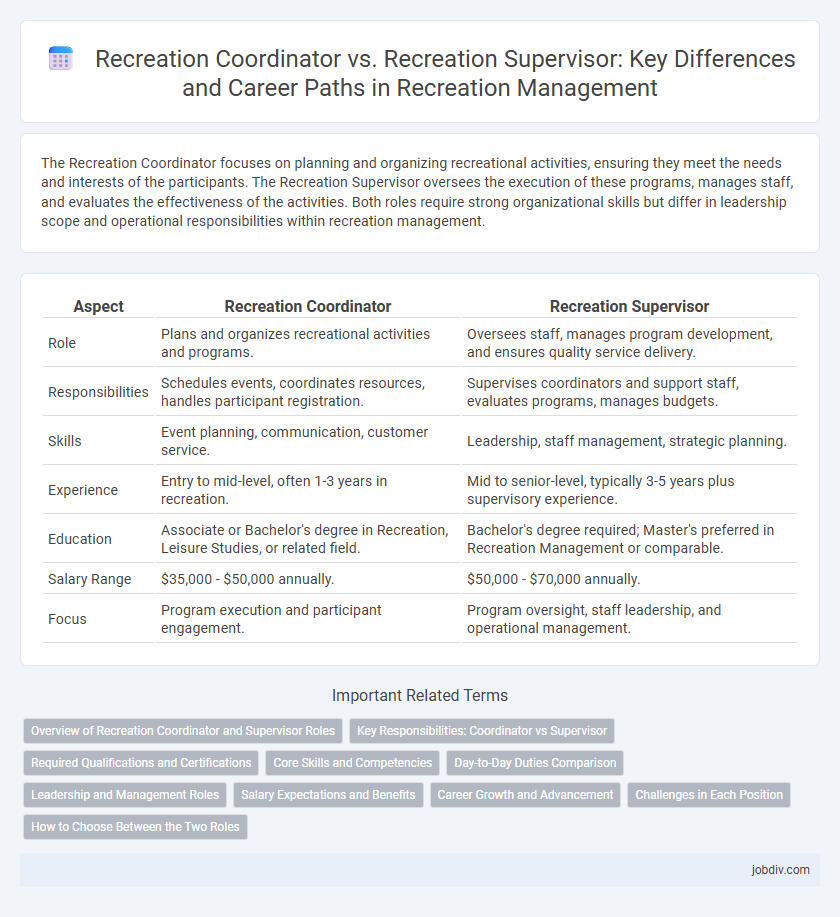The Recreation Coordinator focuses on planning and organizing recreational activities, ensuring they meet the needs and interests of the participants. The Recreation Supervisor oversees the execution of these programs, manages staff, and evaluates the effectiveness of the activities. Both roles require strong organizational skills but differ in leadership scope and operational responsibilities within recreation management.
Table of Comparison
| Aspect | Recreation Coordinator | Recreation Supervisor |
|---|---|---|
| Role | Plans and organizes recreational activities and programs. | Oversees staff, manages program development, and ensures quality service delivery. |
| Responsibilities | Schedules events, coordinates resources, handles participant registration. | Supervises coordinators and support staff, evaluates programs, manages budgets. |
| Skills | Event planning, communication, customer service. | Leadership, staff management, strategic planning. |
| Experience | Entry to mid-level, often 1-3 years in recreation. | Mid to senior-level, typically 3-5 years plus supervisory experience. |
| Education | Associate or Bachelor's degree in Recreation, Leisure Studies, or related field. | Bachelor's degree required; Master's preferred in Recreation Management or comparable. |
| Salary Range | $35,000 - $50,000 annually. | $50,000 - $70,000 annually. |
| Focus | Program execution and participant engagement. | Program oversight, staff leadership, and operational management. |
Overview of Recreation Coordinator and Supervisor Roles
Recreation Coordinators organize and implement community programs, manage schedules, and coordinate resources to ensure successful recreational activities. Recreation Supervisors oversee coordinators and staff, develop program goals, and handle budget management and policy enforcement. Both roles focus on enhancing community engagement, but supervisors have greater leadership and administrative responsibilities.
Key Responsibilities: Coordinator vs Supervisor
Recreation Coordinators primarily manage day-to-day program planning, participant registration, and event logistics, ensuring smooth execution of recreational activities. Recreation Supervisors oversee multiple coordinators, develop strategic programming, allocate resources, and evaluate program effectiveness to enhance community engagement. The supervisor role emphasizes leadership and administrative responsibilities, while the coordinator focuses on operational and participant-centered tasks.
Required Qualifications and Certifications
Recreation Coordinators typically require a bachelor's degree in recreation, leisure studies, or a related field, with certifications such as CPR, First Aid, and Certified Park and Recreation Professional (CPRP) preferred. Recreation Supervisors often need advanced qualifications including several years of experience in recreation management, a bachelor's or master's degree, and certifications like CPR, First Aid, and Advanced Certified Park and Recreation Professional (ACPRP). Both roles demand strong leadership skills, knowledge of program planning, and compliance with state or local regulations governing recreational activities.
Core Skills and Competencies
Recreation Coordinators excel in event planning, community engagement, and resource management, ensuring program effectiveness and participant satisfaction. Recreation Supervisors demonstrate advanced leadership, staff supervision, and strategic planning skills, overseeing multiple programs and maintaining regulatory compliance. Both roles require strong communication, organizational abilities, and a commitment to promoting inclusive recreational opportunities.
Day-to-Day Duties Comparison
Recreation Coordinators typically manage program scheduling, participant registration, and daily activity oversight, ensuring smooth execution of community events. Recreation Supervisors oversee multiple coordinators, handle staff training, budgeting, and evaluate program effectiveness to align with organizational goals. The supervisor role involves strategic planning and administrative responsibilities, while coordinators focus more on direct interaction with participants and on-the-ground program management.
Leadership and Management Roles
A Recreation Supervisor oversees program development, staff training, and budget management, ensuring efficient team operations and service delivery. A Recreation Coordinator focuses more on organizing specific activities, coordinating resources, and facilitating participant engagement under the supervisor's guidance. Leadership in supervision involves strategic planning and performance evaluation, while coordination emphasizes operational execution and direct community interaction.
Salary Expectations and Benefits
Recreation Coordinators typically earn an average annual salary ranging from $38,000 to $50,000, while Recreation Supervisors command higher pay, often between $50,000 and $65,000, reflecting their increased responsibilities. Benefits for both positions commonly include health insurance, paid time off, and retirement plans, with supervisors sometimes receiving enhanced perks such as leadership training and performance bonuses. Salary growth in Recreation Supervisor roles tends to be more significant due to managerial duties and experience requirements.
Career Growth and Advancement
Recreation Coordinators typically manage daily activities and logistics, gaining hands-on experience that lays the foundation for career growth within recreational management. Recreation Supervisors oversee multiple coordinators, take on administrative responsibilities, and develop strategic programs, positioning themselves for higher-level leadership roles such as Recreation Manager or Director. Advancing from Coordinator to Supervisor often involves acquiring certifications like CPR, First Aid, and leadership training, enhancing qualifications for long-term career advancement in the recreation sector.
Challenges in Each Position
Recreation Coordinators often face challenges in managing limited resources and coordinating diverse community programs to meet varied participant needs. Recreation Supervisors encounter complexities in overseeing staff performance, ensuring compliance with policies, and balancing administrative duties with on-the-ground program quality. Both roles require strong problem-solving skills, but Supervisors handle broader organizational challenges while Coordinators focus more on program-specific operational issues.
How to Choose Between the Two Roles
Choosing between a Recreation Coordinator and a Recreation Supervisor depends on your leadership experience and career goals within community programming. Recreation Coordinators typically manage day-to-day activities and direct interaction with participants, requiring strong organizational skills and creativity. Recreation Supervisors oversee multiple teams or programs, focusing on strategic planning, staff management, and budget oversight, making this role suitable for those aiming for higher-level administrative responsibilities.
Recreation Coordinator vs Recreation Supervisor Infographic

 jobdiv.com
jobdiv.com